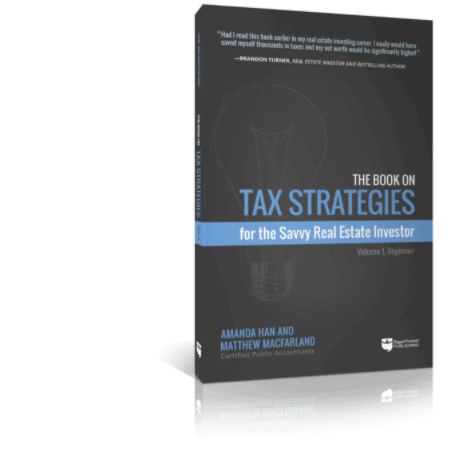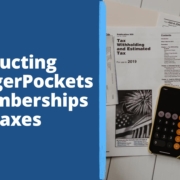How to Deduct Your BiggerPockets Membership on Your Taxes
With all the forums, articles, e-books, and other information available on BiggerPockets, there’s no doubt about the added value of this community. But did you know that BiggerPockets costs are also tax-deductible?
For real estate investors, Members can write off BiggerPockets membership fees (and other educational material) under professional development tax guidelines. That means BiggerPockets can help you make money in real estate while also saving you money in taxes. Double win!
More on taxes from BiggerPockets
What is a tax deduction?
Tax deductions indirectly reduce the amount of tax you owe by subtracting allowable expenses from your income. That adjusted income is then subject to the tax rate in your applicable tax bracket to determine your total tax liability.
Tax deductions are not tax credits. Tax credits directly reduce the amount of tax owed; they come straight off the bottom line, so to speak. Some tax credits also increase the amount of a refund, whereas tax deductions never do.
On a personal level, taxpayers are entitled to either the standard deduction (which in 2021 is $12,550 for singles and $25,100 for couples) or itemized deductions, whichever is greater. If you believe that you have more personal deductible expenses than the standard deduction (such as mortgage interest, property tax, charitable donations, health costs, etc.), then it’s in your best interest to itemize your deductions.
In addition, taxpayers who run a personal business (like real estate investors) can deduct business expenses regardless of whether they itemize their personal deductions or take the standard deduction. Business expenses are listed on a separate form and can be claimed no matter what.
What are tax-deductible professional development expenses?
One of the business expense categories that can be claimed as a tax deduction is professional development, which includes dues and subscriptions. For investors, that means BiggerPockets membership fees and materials are one of the deductible expenses that you can and should itemize on your taxes.
To qualify as a professional development deduction, the expense must maintain your skills, increase your knowledge, or improve your income in regard to your current job. If you are currently involved in real estate investing, that means BiggerPockets expenses qualify as a deduction.
Self-development expenses are not deductible if they don’t relate or only generally relate to your current employment. Development or education that will enable you to change or gain employment also isn’t deductible.
While there’s a limit to what you can claim as a professional development expense, there’s not a limit to how much you can claim. And contrary to popular belief, professional development expenses are tax-deductible regardless of whether the investor has an LLC or files as an individual.
Is the cost of BiggerPockets tax-deductible?
Yes! As mentioned, BiggerPockets memberships, books, and other materials are tax-deductible since they are real estate business expenses. BiggerPockets products are all costs that investors incur in order to help with their real estate investments. Therefore, those costs are tax-deductible business expenses that can help to reduce taxable income from rentals, flips, wholesales, BRRRRs, and commissions.
For newbie investors who end up with no real estate income in the current year, BiggerPockets expenses can be carried forward to offset real estate income generated in future years. If you have no real estate income to offset, you will want to reserve the BiggerPockets deduction and use it in a year when you do realize real estate income. More on this in the next section.

Dreading tax season?
Not sure how to maximize deductions for your real estate business? In The Book on Tax Strategies for the Savvy Real Estate Investor, CPAs Amanda Han and Matthew MacFarland share the practical information you need to not only do your taxes this year—but to also prepare an ongoing strategy that will make your next tax season that much easier.
How would I enter a BiggerPockets deduction on my taxes?
To itemize business-related deductions, most tax filers will need to fill out the Schedule C of Form 1040. This schedule specifically details profit and loss from a business and therefore keeps business deductions separate from personal deductions (which can be itemized on Schedule A).
Professional development expenses such as BiggerPockets costs are considered “Other expenses” (line 27) of the Schedule C form. That means you’ll need to list the costs as line items on the back page in “Part V: Other Expenses,” create a total (line 48), and then transfer that total to the “Other expenses” line on the front (line 27).
Once you locate line 27, you’ll notice that you have the option to claim the expenses in the current tax year (line 27a) or reserve the expenses for another year (line 27b). If you don’t have real estate income to offset in the current year, you can reserve your BiggerPockets costs for another year by putting the total in line 27b.
Taxpayers who use tax software can use the on-screen prompts to enter their business expenses, and the software will then auto-fill them into Schedule C. The key is to make sure that the expenses are specifically tagged as business-related so that they don’t interfere with personal deductions.
For example, in TurboTax, you’ll want to click on the “Business” tab first, then “I’ll choose what I work on.” That screen will allow you to update your business income and expenses properly; this is where BiggerPockets costs should go.
As always, tax situations differ greatly, so if you have any questions about how to maximize your real-estate-related deductions, be sure to talk with an accountant. Our professional services network can help you locate an investor-friendly accountant in your area.




 :215-447-7209
:215-447-7209 : deals(at)frankbuysphilly.com
: deals(at)frankbuysphilly.com
